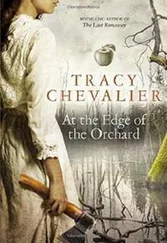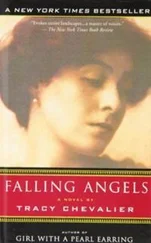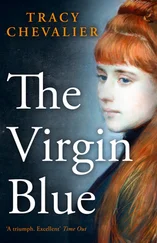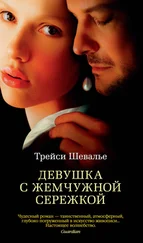‘Of course. The Virgin,’ I said softly.
There was something about her expression that made her different from Nicolas Tournier's Virgin. I closed my eyes and tried to remember it: the pain, the resignation, the strange peace in her face. I opened my eyes and looked at the figure in front of me again. Then I saw it: it was in the mouth, the tight little turns at the corners. This Virgin was angry.
When I left the chapel again the sun had come back out and Jacob was gone. I walked toward town through the newer houses, ending finally at the Protestant church, the one I'd seen when I first woke up in Jacob's house. It was a big building, made of limestone and surrounded by old trees. In some ways it reminded me of the church in Le Pont de Montvert: both were situated in the same place in relation to the town – not in the centre, but still dominant, halfway up the north slope of a hill, with a grassy porch and wall where you could sit and look out over the town. I circled the church and found the front entrance open. Inside there was more decoration than there had been in the church at Le Pont de Montvert, with marble floors and a bit of stained glass in the choir. Still, it felt bare, austere and, after the Chalières chapel, large and impersonal. I didn't stay long.
I sat on the wall in the sun, just as I had before in Le Pont de Montvert. It was warm now and I took off my jacket. Underneath, my arms had broken out with psoriasis again. ‘Dammit,’ I muttered. I folded my arms to my chest, then straightened them and held them up to the sun. The stretching movement made a patch on my arm fill with blood.
At that moment a black Labrador bounded up to me, scrambled half onto the wall and pushed his head into my side. I laughed and petted him. ‘Perfect timing, dog,’ I said. ‘Don't let me wallow.’
Lucien appeared across the green. As he approached I got a better look at him than I had the night before, at his baby face, dark wiry hair and wide hazel eyes. He must have been about thirty, but he looked like he'd never been touched by worry or tragedy. A Swiss innocent. I glanced down, deliberately keeping my psoriasis exposed. I noticed another patch on my ankle and cursed myself for forgetting to pack my cortisone cream.
‘ Salut, Ella ,’ he said, standing awkwardly until I invited him to sit down. He was wearing old shorts and a T-shirt, both covered in spots of paint. The Lab looked at us, panting, tail moving; when he was sure we weren't going anywhere, he began nosing around the nearby trees.
‘Are you a painter?’ I asked to break the silence, wondering if he'd heard of Nicolas Tournier.
‘Yes,’ he replied. ‘I'm working up there.’ He gestured behind us up the hill. ‘You see the ladder?’
‘Ah, yes.’ A house painter. This shouldn't make a difference, I said to myself. But my questions dried up; I didn't know what to say.
‘I build houses too. I fix things.’ Lucien was looking out over the town, but I could see he was also surreptitiously glancing at my arms.
‘Where do you live?’ I asked.
He pointed out another house up the hill, and glanced at my arms again.
‘It's psoriasis,’ I said abruptly.
He nodded once; he was not a talkative man. I noticed his hair had streaks of white paint in it and his forearms were covered with a mist of white speckles that comes from using a roller. I was reminded of moving with Rick: the first thing we did when we got a new place was to paint every room white. Rick said it was so he could see the dimensions of the rooms better; for me it was like cleansing them of ghosts. Only after we'd lived in a place for a while, when its character became apparent and we felt comfortable living in it, did we start painting rooms different colours. Our house in Lisle was still white.
The phone call came a day later. I don't know why it caught me off-guard: I'd known my other life would intrude eventually, but had done nothing to prepare myself.
We were eating fondue at the time. Susanne had been amused to learn that after Swiss Army knives, clocks and chocolate, fondue was the fourth thing Americans associate with Switzerland and insisted on making it for me. ‘From an old family recipe, bien ŝur ,’ she teased. She and Jacob had invited a few people: Jan was there, of course, as well as a German-Swiss couple who turned out to be the neighbours with the blue shutters, and Lucien, who sat next to me and stared at my profile from time to time as we ate. At least I had covered my arms so he couldn't stare at the psoriasis.
I'd tried fondue only once, when I was young and my grandmother made it. I didn't remember much about it. Susanne's was wonderful and extremely alcoholic. On top of that we'd been drinking wine steadily and were getting louder and sillier. At one point I dipped a piece of bread into the cheese and my fork came up empty. Everyone began to laugh and clap.
‘Wait a minute, what is it?’ Then I remembered the tradition my grandmother had taught me: whoever loses their bread in the fondue pot first will never marry. I laughed too. ‘Oh, no, now I'll never marry! But wait a minute, I am married!’
There was more laughter. ‘No, no, Ella,’ Susanne cried. ‘If you drop the bread first it means you will marry, and soon!’
‘No, in our family it means you won't marry.’
‘But this is your family,’ Jacob said, ‘and the tradition is that you will marry.’
‘Then we must've gotten it wrong somewhere. I'm sure my grandmother said -’
‘Yes, you got it wrong the way the family's last name is wrong,’ Jacob declared. ‘Tuurr-nuurr,’ he pronounced dolefully, drawing out each syllable. ‘Where are the vowels to lift it and make it sound beautiful, like Tour-ni-er? But never mind, ma cousine , you know what your real name is. Do you know,’ he continued, turning to his neighbours, ‘that my cousin is a midwife?’
‘Ah, a good profession,’ the man replied automatically. I felt Susanne's eyes on me; when I glanced at her she looked down. Her wine glass was still full and she hadn't eaten much.
When the phone rang Jan got up to answer it, glancing around the table, his eyes coming to rest on me. He held the phone out. ‘It is for you, Ella,’ he said.
‘Me? But -’ I hadn't given anyone the number here. I got up and took it, everyone's eyes on me.
‘Hello?’ I said uncertainly.
‘Ella? What the hell are you doing there?’
‘Rick?’ I turned my back on the table, trying to create a little privacy.
‘You sound surprised to hear from me.’ I'd never heard him sound so bitter.
‘No, it's just – I didn't leave the phone number.’
‘No, you didn't. But it's not that hard to get the number of Jacob Tournier of Moutier. There were two listed; when I called the other one first he told me you were here.’
‘He knew I was here? Another Jacob Tournier?’ I repeated stupidly, surprised that Rick had actually remembered my cousin's name.
‘Yeah.’
‘Well, it's a small town.’ I glanced around. Everyone was eating, trying to look like they weren't listening to me, but listening all the same, except for Susanne, who got up abruptly and went over to the sink, where she took a deep breath by the open window.
They all know my business, I thought. Even a Tournier across town knows my business.
‘Ella, why did you go away? What's the matter?’
‘Rick, I – Look, can we talk another time? Now's not a good time.’
‘I take it you left your wedding ring on the bedroom floor as some kind of statement.’
I spread out my left hand and stared at it, shocked that I hadn't even noticed it was gone. It must have fallen out of my yellow dress when I was changing.
Читать дальше
Конец ознакомительного отрывка
Купить книгу
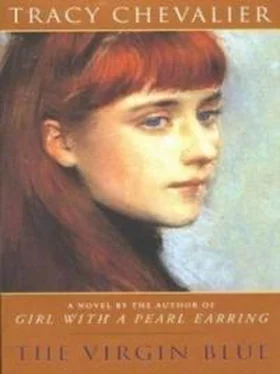
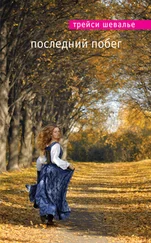
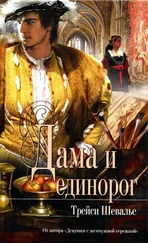
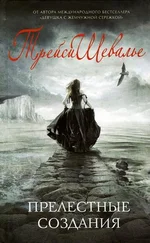
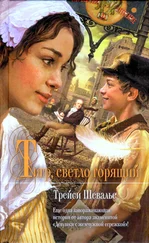
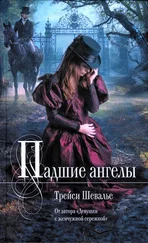
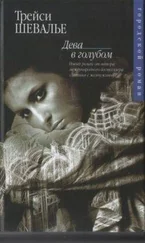
![Трейси Шевалье - Тонкая нить [Литрес]](/books/386177/trejsi-shevale-tonkaya-nit-litres-thumb.webp)
